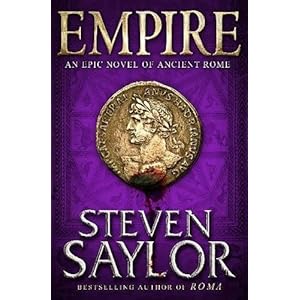
Why, when this is a sequel to Roma, is Empire given an English language title, rather than using, say, Imperium?
Empire follows on from the earlier novel, with a small gap (less than that between some of the individual chapters which make up the story). It describes the story of Rome from AD 14 to AD 141 - the years in which the Roman Empire became an established institution. Once again, the viewpoint characters are the various members of the (fictional) Pinarius family which was established at the beginning of Rome's history, according to Roma.
As Saylor points out in the afterword, this is one of the best documented periods of Roman history, but the surviving histories concentrate (with varying degrees of accuracy and/or bias) on the colourful figures of the emperors, who include some of the best and some of the most monstrous ruler of any nation. Saylor complains that contemporary historians were excessively emperor-centred, but then goes on to do the same thing himself: the novel is really about how successive generations of the Pinarii interacted with the emperors of their day, becoming intimately involved with most of the emperors from Tiberius to Hadrian. So Empire, too, centres on the emperors, and, to be honest, this does not work too well. I ended up feeling that it would be more fun to work through the histories for myself, or read some novels which concentrate on just part of the period, such as Robert Graves' I, Claudius. (Graves is a clear and acknowledged influence on Saylor's historical fiction.) The episodic nature of the story, as the focus moves from generation to generation, does not make a gripping novel (I felt much the same about Roma). Saylor is to my mind much better with the more focused detective stories he has written, whether set in ancient Rome or not.
The main lesson from the history as presented here is just how lucky you need to be to survive once you have attracted the attention of a Caligula, Nero or Domitian. Indeed, it becomes implausible that the family continues to exist after close contact with so many emperors.
It's worth reading, if you're vaguely interested in the history, but it's better to read the originals in a good translation - and they are generally available free online. My rating - 5/10.
Edition: Corsair, 2011
Review number: 1431



No comments:
Post a Comment